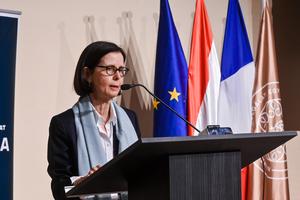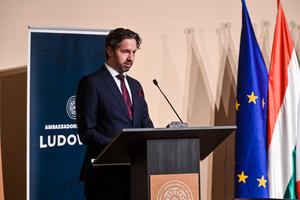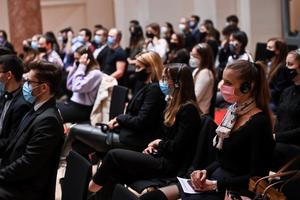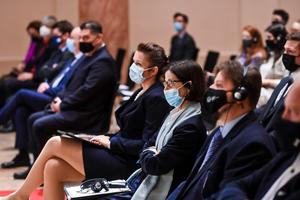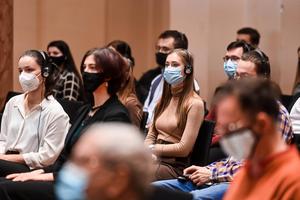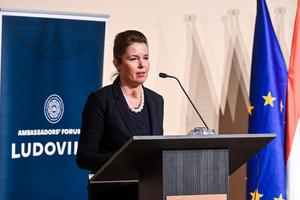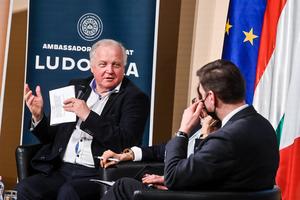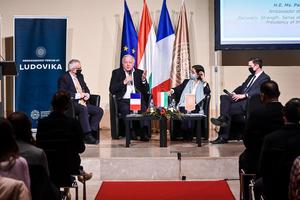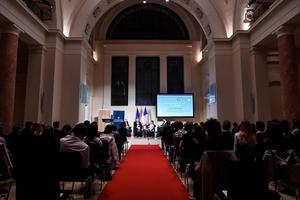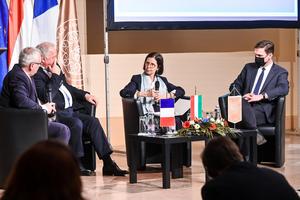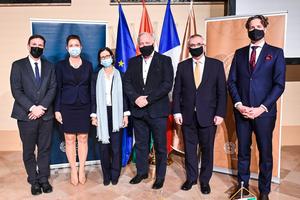France, which currently holds the rotating Presidency of the Council of the European Union, was represented at the traditional Ambassadors' Forum at Ludovika organised by the International Directorate of the University of Public Service. The guest of the evening, held at the Ludovika Main Building, was the French Ambassador in Budapest, Pascale Andréani, who spoke about the Presidency's agenda and the current challenges of the European Union (EU).
The Vice-Rector for International Affairs of the University stressed in her welcome speech that the French presidency has started its work in "particularly turbulent times". Boglárka Koller -quoting the French politician Jean Monnet - said: 'The Union is the fruit of difficult times'. It is not only the long-standing pandemic, but also the increasingly dangerous crisis in Ukraine, which makes these times extremely difficult. "Our university offers a wide range of courses and programmes to advance European integration, providing a platform for discussing the challenges," said Boglárka Koller. She concluded her speech with another quote from Jean Monnet: "Crisis is an opportunity for progress."
Rebuilding. Strength. Sense of belonging. These are the slogans of the French Presidency, said the French Ambassador to Budapest. Pascale Andréani added: "Since the Treaty of Rome, these words have been the basis for the functioning of the European Union, and they will be the ones that will be adhered to during the French Presidency. The ambassador said that -in addition to properly addressing the crisis in Ukraine- the most important task is to bring peace to the crisis zones in the Balkans and North Africa. The White Paper of the EU, which sets out the procedures for common European defence action, will serve as a basis for this. She added that the most effective way of economic and social recovery after crises must be found, and a common European minimum wage could be one of these solutions. "President Macron also sees the achievement of gender equality as a major task" said Pascale Andréani.
On the issue of the rule of law, she stressed that "we all want to find common ground, to find a compromise." Reflecting on a recent ruling by the European Court of Justice, she said it is important to hold a consultation to better understand the mindset of EU citizens. The ambassador also pointed to the importance of the Erasmus+ programme, which she described as one of the EU's greatest academic successes. „Diversity in Europe makes us stronger," stressed Pascale Andréani, so we must be willing to compromise and understand each other, and besides the French government the other Member States must be also committed to this.
A round table discussion followed on the challenges of the EU Presidency. „The French have a very strong sense of commitment, which has influenced European ideals since the Revolution of 1789," said the Associate Professor at the Faculty of Political Science and International Studies. Ferenc Robák -retired ambassador- also mentioned that one of the main objectives of the French presidency is to emphasise linguistic diversity. "Many people, especially politicians, think that the EU is a closed community, but we have to realise that the world is constantly changing and we are facing new challenges every day," he added. According to Ferenc Robák, the rotating presidency has fallen to a country that has already played a significant role in the day-to-day functioning of the EU, and the fact that this is not a national presidency does not change it.
"The issue of integration was already on the agenda during the Hungarian presidency and it is still a key task during the French presidency," said the retired ambassador. He confirmed that "the Union evolves mostly during crises, so it is very important to have vision." Responding to this, Pascal Andréani stressed, "This vision will not come about by itself, but it is essential to have people in leadership positions like Robert Schumann, who also had a dream." Reinforcing this, Gergely Fejérdy, Senior Research Fellow at the Institute for Foreign Affairs and Trade, pointed out that there are many French politicians who have been catalysts for the European Union.
The next question was about the cooperation between the African Union and the European Union, which raised the issue that assistance during a pandemic comes with conditions, such as respect for the rule of law. The question is: can these countries abide by this, especially if it is a constant theme in Central Europe? - said Attila Pókecz Kovács, professor at the Department of History of State and Law, who moderated the event. Reflecting on this, Pascal Andréani said that the programme of the Presidency is permeated by the Francophone values that have enabled it to successfully resolve crises in the past. She added: "It is difficult to compare the African situation with European law and values, but it is our duty to help where we can."
Text: Gyalog Kincső, Pap Melinda Patrícia
Photos: Szilágyi Dénes
